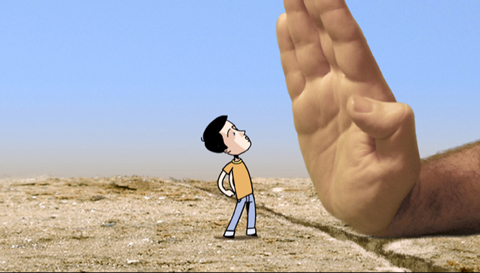Decades of violence and recent border closures in the Palestinian territories have resulted in major health problems, including malnutrition, stunted growth in children and high infant mortality rates, international experts said.
The research, published yesterday in a special issue of the medical journal The Lancet, was accompanied by an editorial calling for a Middle East peace agreement as a means to improve the health of the Palestinians.
“The health situation in the occupied Palestinian territory shows the urgency of finding a political solution,” former US president Jimmy Carter wrote in the editorial.

PHOTO: AP
In an introduction, Lancet editor Richard Horton said “health offers a new way into a new dialogue for peace and justice.”
Mark Regev, a spokesman for the Israeli government, called the Lancet report one-sided.
“This is propaganda in the guise of a medical report,” he said.
Experts said malnutrition was on the rise in the Gaza Strip, leading to an increase in the rate of stunted growth in children from about 8 percent in 1996 to 13 percent in 2006. In some parts of Gaza, malnutrition is so severe that nearly 30 percent of children have stunted growth.
In the five papers, researchers found serious disparities between the health of Palestinians and other people in the Middle East.
In Gaza, experts estimated there were about 27 deaths per 1,000 live births in 2006.
In contrast, there were about four deaths per 1,000 live births in Israel, a figure comparable to most Western countries.
The research also showed that after decades of improvement, infant mortality rates in Gaza and the West Bank began to plateau in the 1990s. Between 1990 and 2005, the territories had the smallest reduction in death rates in children under 5, a 2 percent drop.
By comparison, death rates in children under 5 in Egypt dropped by 70 percent, and by nearly 50 percent in Iraq.
Regev, the Israeli government spokesman, said the death rates in Gaza were not because of Israel.
“How much of this is because of Hamas’ regime?” he asked, referring to the area’s Islamic militant rulers. “Instead of investing in public health, they’ve invested in violence and conflict.”
Hamas seized control of Gaza in June 2007 from Palestinian President Mahmoud Abbas, who now governs the West Bank.
Israel closed Gaza’s borders after the Hamas takeover, letting in limited amounts of aid and other goods.
Regev said Israel’s influence in the West Bank and Gaza had been beneficial, and that many Palestinians have been treated in Israeli hospitals.
He said that the report also noted the rise of chronic diseases like heart disease and cancer typically seen in more affluent populations. That, Regev said, showed the health of Palestinians was improving.
Experts working in the region said they were not surprised by The Lancet’s findings.
Cecile Barbou of Medecins Sans Frontieres, medical coordinator for the Palestinian territories, said the three-week Israeli offensive against Hamas that ended on Jan. 18 worsened stress levels in Palestinians. She cited data showing that 1,000 more women than usual delivered babies in January and attributed that to women being stressed by the fighting and delivering prematurely.

VAGUE: The criteria of the amnesty remain unclear, but it would cover political violence from 1999 to today, and those convicted of murder or drug trafficking would not qualify Venezuelan Acting President Delcy Rodriguez on Friday announced an amnesty bill that could lead to the release of hundreds of prisoners, including opposition leaders, journalists and human rights activists detained for political reasons. The measure had long been sought by the US-backed opposition. It is the latest concession Rodriguez has made since taking the reins of the country on Jan. 3 after the brazen seizure of then-Venezuelan president Nicolas Maduro. Rodriguez told a gathering of justices, magistrates, ministers, military brass and other government leaders that the ruling party-controlled Venezuelan National Assembly would take up the bill with urgency. Rodriguez also announced the shutdown

Civil society leaders and members of a left-wing coalition yesterday filed impeachment complaints against Philippine Vice President Sara Duterte, restarting a process sidelined by the Supreme Court last year. Both cases accuse Duterte of misusing public funds during her term as education secretary, while one revives allegations that she threatened to assassinate former ally Philippine President Ferdinand Marcos Jr. The filings come on the same day that a committee in the House of Representatives was to begin hearings into impeachment complaints against Marcos, accused of corruption tied to a spiraling scandal over bogus flood control projects. Under the constitution, an impeachment by the

Exiled Tibetans began a unique global election yesterday for a government representing a homeland many have never seen, as part of a democratic exercise voters say carries great weight. From red-robed Buddhist monks in the snowy Himalayas, to political exiles in megacities across South Asia, to refugees in Australia, Europe and North America, voting takes place in 27 countries — but not China. “Elections ... show that the struggle for Tibet’s freedom and independence continues from generation to generation,” said candidate Gyaltsen Chokye, 33, who is based in the Indian hill-town of Dharamsala, headquarters of the government-in-exile, the Central Tibetan Administration (CTA). It

A Virginia man having an affair with the family’s Brazilian au pair on Monday was found guilty of murdering his wife and another man that prosecutors say was lured to the house as a fall guy. Brendan Banfield, a former Internal Revenue Service law enforcement officer, told police he came across Joseph Ryan attacking his wife, Christine Banfield, with a knife on the morning of Feb. 24, 2023. He shot Ryan and then Juliana Magalhaes, the au pair, shot him, too, but officials argued in court that the story was too good to be true, telling jurors that Brendan Banfield set